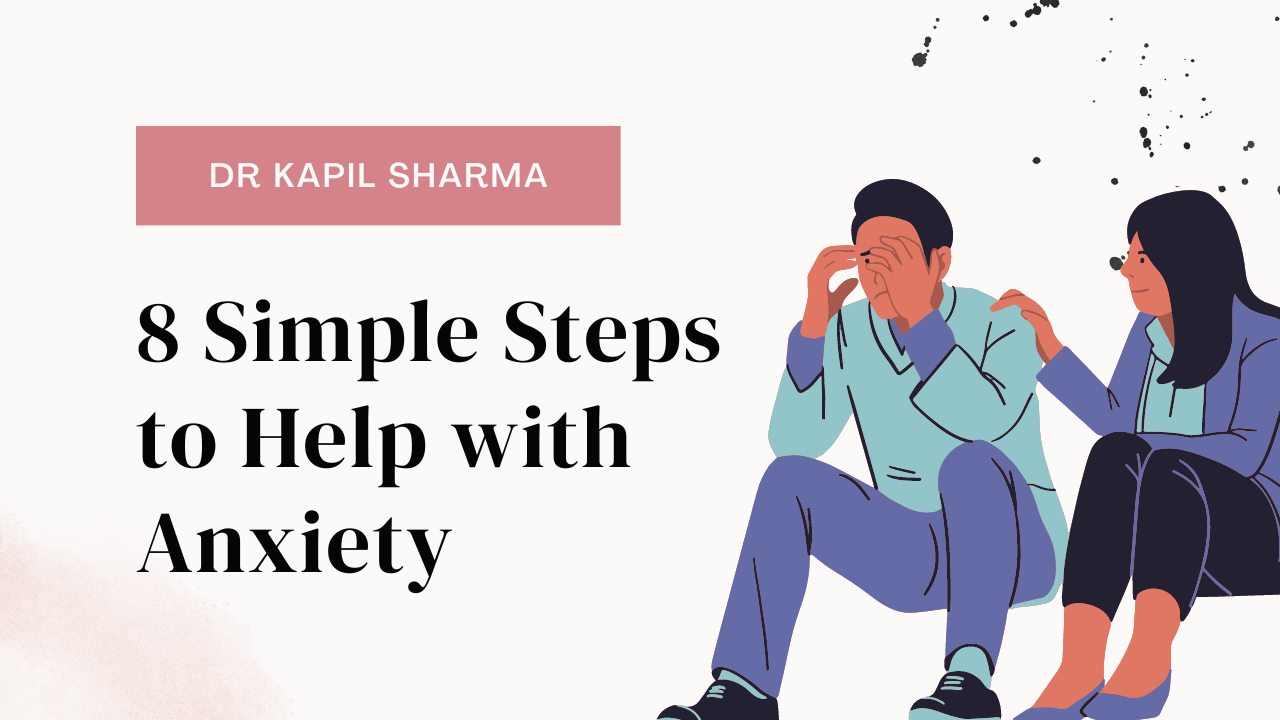
8 Simple Steps to Help with Anxiety
Anxiety can be a challenging and overwhelming experience, affecting various aspects of our lives. However, there are practical steps we can take to manage and alleviate anxiety symptoms. In this article, we will explore eight simple yet effective strategies that can help you cope with anxiety and promote a sense of calm and well-being.
Deep Breathing and Meditation: Deep breathing exercises and meditation techniques can have a profound impact on anxiety levels. Practice diaphragmatic breathing by inhaling slowly through your nose, filling your belly with air, and exhaling through your mouth. Additionally, incorporating mindfulness meditation into your daily routine can help you cultivate a present-moment focus, reducing anxiety-inducing thoughts and promoting relaxation. Consult to the best Anxiety Doctor in Jaipur, Dr. Kapil Sharma.
Regular Exercise: Engaging in regular physical activity is a powerful tool for managing anxiety. Exercise releases endorphins, which are natural mood boosters, and help reduce stress hormones in the body. Find an exercise routine that suits your preferences, whether it’s going for a walk, practicing yoga, or participating in a team sport. Aim for at least 30 minutes of moderate-intensity exercise most days of the week.
Prioritize Self-Care: Taking care of yourself is crucial when dealing with anxiety. Establish self-care practices that promote relaxation and rejuvenation. This may include getting enough sleep, eating a balanced diet, practicing good hygiene, and engaging in activities you enjoy, such as reading, listening to music, or spending time in nature. Prioritizing self-care helps build resilience and supports overall emotional well-being.
Challenge Negative Thoughts: Anxiety often stems from negative or distorted thinking patterns. Challenge and reframe these thoughts by examining the evidence supporting them and questioning their validity. Replace negative thoughts with more realistic and positive ones. Cognitive-behavioral therapy techniques can be helpful in identifying and modifying unhelpful thinking patterns.
Establish a Routine: Creating structure in your daily life can provide a sense of stability and reduce anxiety. Establish a routine that includes regular sleep and wake times, meal times, and designated periods for work, leisure, and relaxation. Having a predictable schedule can bring a sense of order and control, helping to alleviate anxiety symptoms.
Seek Social Support: Connecting with supportive individuals can significantly impact anxiety levels. Share your feelings with trusted friends or family members who can provide understanding and encouragement. Consider joining support groups or seeking professional help through therapy. Sometimes, talking to a trained therapist can provide valuable insights and strategies for managing anxiety.
Practice Stress Management Techniques: Learning stress management techniques can help you cope with anxiety more effectively. Techniques such as progressive muscle relaxation, visualization, and journaling can promote relaxation, reduce stress, and increase self-awareness. Experiment with different techniques to find what works best for you and incorporate them into your daily routine.
Limit Exposure to Triggers: Identify the triggers that exacerbate your anxiety and take steps to minimize your exposure to them. This may involve setting boundaries with certain individuals, reducing time spent on social media, or avoiding specific situations that consistently lead to increased anxiety. Recognize your limits and make choices that prioritize your mental well-being.
Conclusion: While anxiety can be a challenging experience, implementing these simple steps into your daily life can make a significant difference in managing and reducing anxiety symptoms. Remember that everyone’s journey is unique, and it may take time to find the strategies that work best for you. Be patient, kind to yourself, and seek support when needed. You can book an appointment to Dr. Kapil Sharma. He is the best psychiatrist in Jaipur. With consistent effort and self-care, you can navigate anxiety and move towards a calmer and more balanced life.

